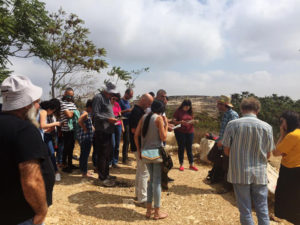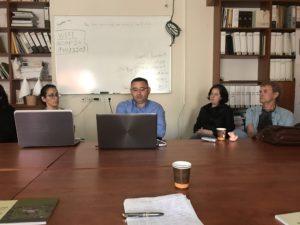Planners Course Meets with Alaa Ghantous
On Friday, November 3rd, our group of Urban Planners and Architects as Change Agents, which the School for Peace holds in  cooperation with the Arab Center for Alternative planning, met at the center’s headquarters in Eilaboun for their monthly meeting. The first part of the meeting was dedicated to processing the previous month’s tour in Jerusalem, where the participants came face to face with the reality of discrimination and occupation in East Jerusalem. After processing the tour, we heard feedback from the participants about the course up until that point and a number of suggestions for improvement were raised. The participants noted the importance of such tours to the learning process and asked that more tours be added to the course in the future. They also suggested to dedicate meetings to in depth examination of specific topics, or alternately to dedicate meetings to discussing and solving specific issues the participants face out on the field or in their work experience, and by doing so make better use of the professional knowledge found in the group.
cooperation with the Arab Center for Alternative planning, met at the center’s headquarters in Eilaboun for their monthly meeting. The first part of the meeting was dedicated to processing the previous month’s tour in Jerusalem, where the participants came face to face with the reality of discrimination and occupation in East Jerusalem. After processing the tour, we heard feedback from the participants about the course up until that point and a number of suggestions for improvement were raised. The participants noted the importance of such tours to the learning process and asked that more tours be added to the course in the future. They also suggested to dedicate meetings to in depth examination of specific topics, or alternately to dedicate meetings to discussing and solving specific issues the participants face out on the field or in their work experience, and by doing so make better use of the professional knowledge found in the group.
After hearing feedback, Mr. Alaa Ghantous (accountant) spoke about his part in the efforts to achieve government resolution 922, and about all the factors which contributed to that success. First and foremost, he noted the professional, hard work done by all stakeholders; second, the cooperation between all political parties, the Arab Local Authorities Committee and the civil society organizations; presentation of accurate data in all meetings with government officials; and last but not least, pragmatism. This alongside the combination between the great need for grants that will close the gaps between the Arab and Jewish population, and between the government’s fear and understanding that their global economic ratings will deteriorate if indeed they do not address the problems which afflict the Arab population.
In the last part of the meeting we discussed possible directions for projects which the participants will initiate with the aim of influencing a social issue they care about. In the past, graduates of our joint program with the Arab Center for Alternative Planning carried out a number of social change initiatives, which stemmed from the understanding that planning is a tool with which one can directly affect the relations between Jews and Palestinians in Israel. One such project was a letter directed to the Prime Minister, in the name of the Arab-Jewish Planners Forum, against the discriminatory planning and building policy towards Arabs and against house demolitions. This letter was signed by hundreds of architects and planners all over the country, and received wide media coverage.
Planning or dis-planning may become in many cases a tool for controlling an occupied minority or nation. Planning in Israel/Palestine is influenced by political powers and economic interests, to the point where it seems, sometimes, that it is but a tool for promoting the interests of those with power in society. The planning process today is not viewed through the individual rights lens, or through the right of community to equality, transparency and sharing- not among the public, nor among the authorities.
 This is the third year in a row the Urban Planners and Architects as Change Agents course if being held, in cooperation with the Arab Center for Alternative Planning, following the success of the first two courses. The program deals with the meeting points between nationality and profession in context of the Israeli – Palestinian conflict, with the dilemmas planners face when they come to approve plans or plan an area and a city, the decisive considerations a planner faces: whether human rights, residents’ welfare, financial consideration, or political and national ones.
This is the third year in a row the Urban Planners and Architects as Change Agents course if being held, in cooperation with the Arab Center for Alternative Planning, following the success of the first two courses. The program deals with the meeting points between nationality and profession in context of the Israeli – Palestinian conflict, with the dilemmas planners face when they come to approve plans or plan an area and a city, the decisive considerations a planner faces: whether human rights, residents’ welfare, financial consideration, or political and national ones.
The combination of the School for Peace’s vast knowledge in the field of conflict resolution and facilitation of groups in conflict, and the professional knowledge on planning issues which the ACAP holds, allows for a meaningful learning program through which the participants acquire the tools they need to change the reality around them.
